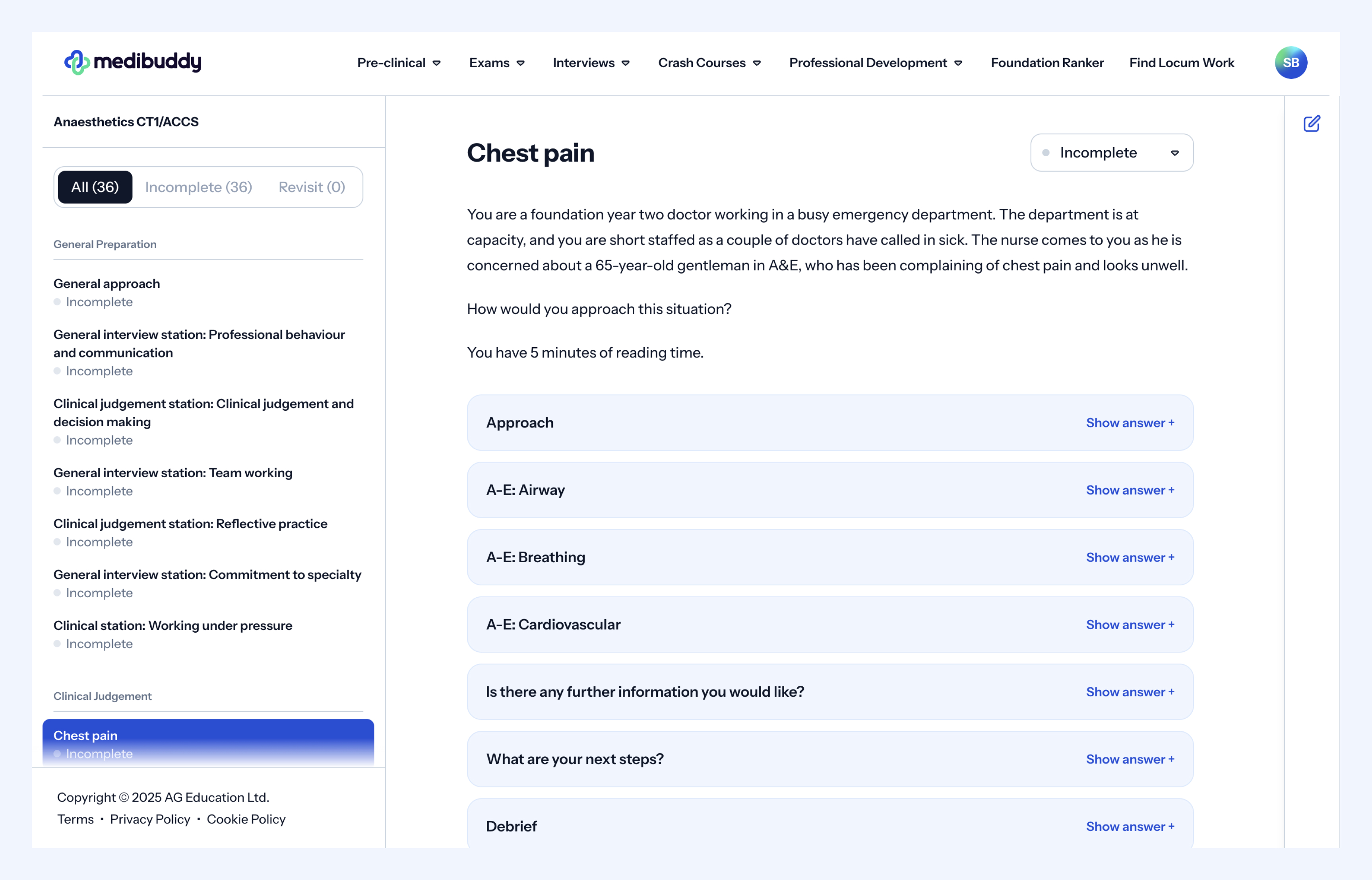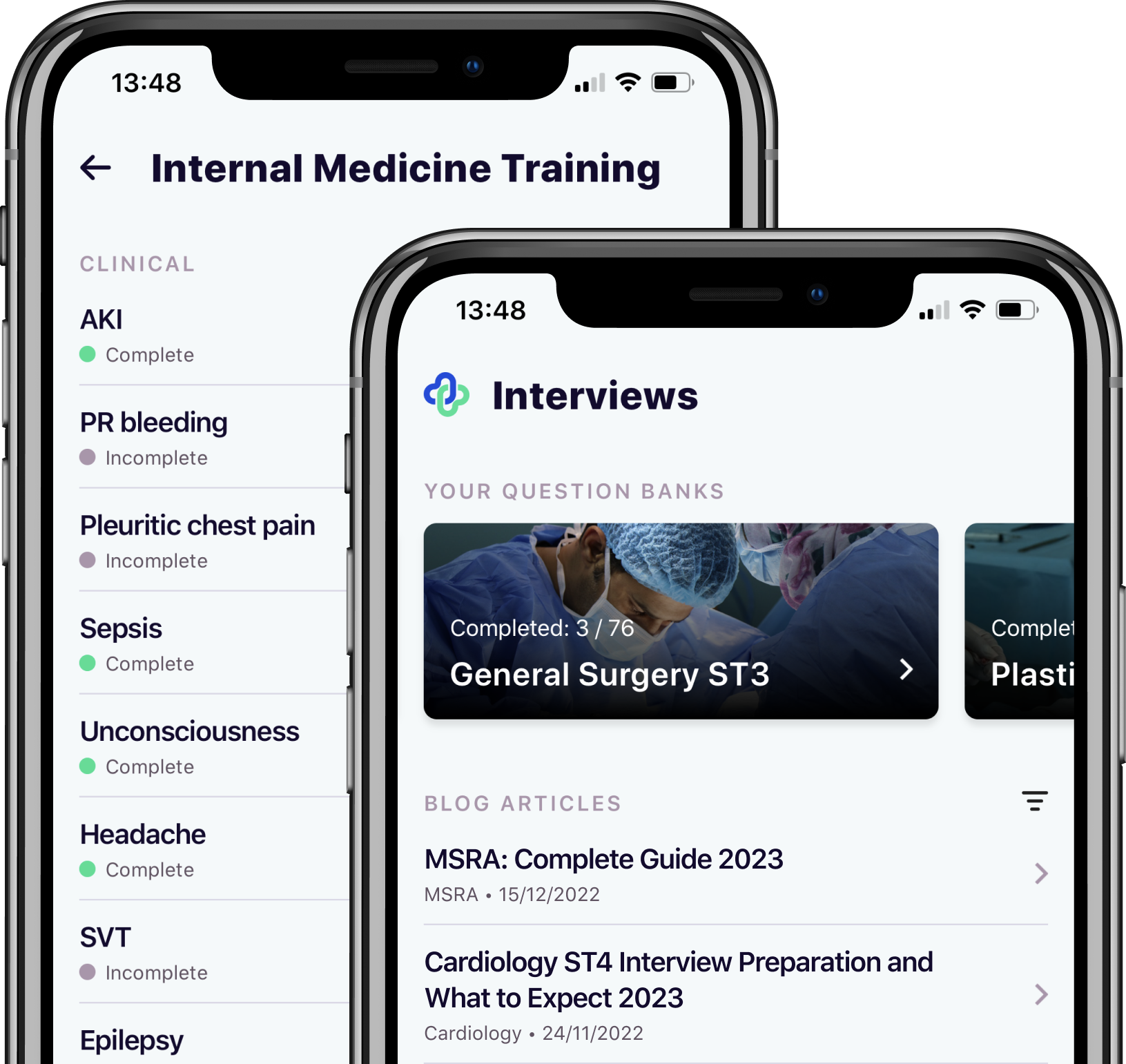
Anaesthetics CT1/ACCS Interview Guide 2026
If you’re interested in applying for Anaesthetics Core Training (CT1) but need some advice and guidance on how to navigate the process, our Anaesthetics CT1 interview guide for 2026 has been created to help you. We’ll cover the key 2026 recruitment dates, the interview format and how the assessors score each performance, giving you the best chance of making a good impression.
Anaesthetics ACCS is an alternative entry point to the world of anaesthetics. It’s a slightly longer course pathway than CT1, with additional time spent in emergency and general medicine. However, the two pathways have many similarities and share the same application and interview process.
Anaesthetics CT1 is a competitive specialty, and the 2025 competition ratio demonstrates this, with 6,770 applications for 539 posts. This gave a competition ratio of 12.56, meaning over 12 people applied for each post.
Maximise your performance at the Anaesthetics CT1/ACCS interview by preparing effectively and efficiently with our Interview Question Bank.
Anaesthetics CT1/ACCS Application
To be eligible for Anaesthetics CT1, you must have achieved one of the following foundation competencies in the 3.5 years running up to the start date:
- Current employment in a UKFPO-affiliated foundation programme
- Awarded an FPCC from a UK-affiliated foundation programme within the 3.5 years preceding the advertised post-start date
- Current employment in a GMC-approved Specialty Training Programme
- 12 months of medical experience after full GMC registration (or equivalent post-licensing experience) and evidence to commence specialty training in the form of a Certificate of Readiness to Enter Specialty Training
If you’re eligible for Anaesthetics CT1, you’ll be invited to sit the MSRA, which will be used as a shortlisting tool to determine who’s invited to an interview should the applicant numbers exceed capacity. Your MSRA results will also contribute 15% towards your total selection score. The other 85% comes from your online interview, which will be covered in more detail below.
You can find more information about the eligibility criteria in the 2026 Anaesthetics CT1 Person specification.
Anaesthetics CT1/ACCS Key dates
The key dates for Anaesthetics CT1 and ACCS are as follows:
| Stage | Date |
|---|---|
| Applications open | 23 October 2025 |
| Applications close | 20 November 2025 |
| Invitations to MSRA | 15 December 2025 |
| MSRA window | 6 — 19 January 2026 |
| MSRA results | From 11 January 2026 |
| Invitations to interview | 17 February 2026 |
| Interview window | 25 February — 13 March 2026 |
| Offers Released | 24 March 2026 |
Anaesthetics CT1/ACCS Interview format
Anaesthetics CT1 interviews continue to take place online. There are two interview stations, each lasting 15 minutes. However, after allowing for the waiting time before the general station and the five-minute reading time you’re permitted before the clinical scenario, you can expect the interview to take around 50 minutes.
There will be two assessors for each station (so four in total), which can be daunting. But, like any interview or exam, preparation is key so you know you have the knowledge and confidence to deliver your answers. Practising the types of questions that are likely to come up in the interview is important here. You can do this by using question banks and verbalising your answers to yourself, a friend or a family member.
The two Anaesthetics interview stations are:
Clinical Judgement Station
You’ll have five minutes to read the clinical scenario. This is an opportunity to really prepare yourself for the incoming questions. You can make notes here and think about how you might answer the questions.
You aren’t expected to have a lot of knowledge and experience with anaesthetics at this stage. Instead, the clinical scenario will be about a situation or emergency that’s familiar to FY2 doctors, assessing you in the following areas:
- Clinical judgement and decision-making
- Reflective practice
- Working under pressure
Below is the type of scenario you can expect to find in our Anaesthetics CT1/ACCS Interview Question Bank:

General Interview Station
The general interview station is less specific, encompassing a wide range of topics. It’s your chance to show that you’re a well-rounded doctor, allowing you to highlight your strengths and achievements. You’re still limited to 15 minutes for this interview station. So, you should aim to be concise and direct with your answers. During this station, the interviewers will be assessing you in the following areas:
- Communication & Professional Behaviour
- Commitment to Specialty
- Teamwork
Anaesthetics CT1/ACCS Interview Scoring
The 2026 scoring matrix has not yet been confirmed. In the meantime, the Anaesthetics CT1 scoring matrix used for the 2025 interview is included below to give you an indication of how candidates were assessed. As you can see, each assessor has a potential 15 marks to award. Overall, 100 marks are available, with the remaining 40 marks coming from your global rating. Each assessor will rate you out of 10, reflecting their overall impression of you.
| Clinical Interview Station 1 |
General Interview Station 2 |
Totals | |||
|---|---|---|---|---|---|
| Assessor A | Assessor B | Assessor C | Assessor D | ||
| Professional Behaviour & Communication | 5 | 5 | 10 | ||
| Clinical judgement & decision making | 5 | 5 | 10 | ||
| Teamwork | 5 | 5 | 10 | ||
| Reflective practice | 5 | 5 | 10 | ||
| Commitment to specialty | 5 | 5 | 10 | ||
| Working under pressure | 5 | 5 | 10 | ||
| Global Rating | 10 | 10 | 10 | 10 | 40 |
| Total Interview Score | 50 | 50 | 100 | ||
Receiving a global rating score of 1 from each of the assessors in one of the stations can lead to your application being vetoed, and you need to score at least 60 marks overall to be successful. So, how you present yourself and deliver your answers plays an important role in determining your success.
Good luck!

Take your subscriptions with you
Our mobile app allows you to access your interview and exam question banks wherever you are.


